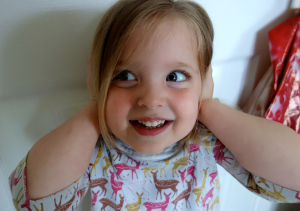My kids don’t listen to me. Or, rather, they listen to me, but rarely the first time and rarely without protest. Everything, it seems, is up for negotiation in our house, no matter how clear or firm I think I’m being. “You can’t have a snack.” But why? “It’s time for your bath.” But I don’t want one! “Lights out now.” But I’ve got 10 pages left! The other day I threatened to pull the car over when my 4-year-old wouldn’t stop kicking the back of my seat. And then I did, swerving into a side street more abruptly than I intended, and he looked at me with wide eyes and promptly started kicking it again.
My mother has long believed that for young children to listen to their parents they need to fear the consequences. I yell at my kids when they get out of hand, and to my own ears I sound like a banshee, but it doesn’t necessarily scare them into submission. I take away privileges (no iPad, the horror!), but it doesn’t ensure the offending behavior won’t be repeated. Even my husband, with his objectively stern manner, doesn’t intimidate them enough that they don’t talk back.
How do you command respect as a parent? This is a question I’ve been asking myself a lot recently, because I am increasingly convinced that I don’t. It is through fear? Is it through discipline? Is it through quiet authority?
I consider myself a disciplinarian, but of course, if I were an effective one, my kid wouldn’t still be kicking the back of the seat after the fifth time I told him not to. I set boundaries, I enforce them; I am not, in other words, a pushover. And yet, at the same time, there must be some Gestalt to my parenting that is inherently non-authoritarian, something that fails to trigger blind obedience, that says to my children: the conversation is not closed. Not really.
You can read the rest of the article here, at The Washington Post.



I think I remember a little girl who was quite vocal about her wants and non-wants
Love,
Dad >
Your Dad says it all! Culture is not the reason. It is the way you (and spouse) have unconsciously raised your children. And, that shaping was in turn learned from your parents. This is named by me and a colleague “emotional conditioning.” It is akin to what Pavlov did with his dogs. Please see my “Self-Understanding Blog” at ChristineAdamsMD.org
But don’t you think that culture is at least in part responsible for *how* we condition our children as parents, our choices, instincts, etc?
A child’s “culture” is his parents and immediate household. In 80 years of combined practice a colleague and I have found the same conditioned messages are unconsciously transmitted to children by parents even when the broader culture or national origin is different. How the child learns to see himself is from the way his parents see and treat him and how, in turn, his parents’ parents saw his parents when they were toddlers, and so on for each generation. It is a form of unconscious learning that occurs within the first two years of a child’s life. Such parental messages are remarkably consistent whether in the USA, Indonesia, Russia, Argentina, or any other country.